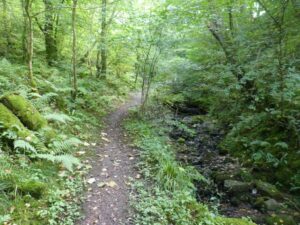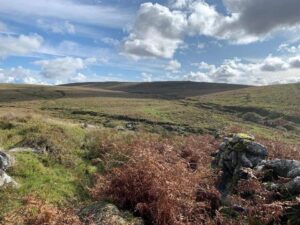Support us from £3/month
We deal with almost 1000 cases a year assisting communities, groups and individuals in protecting their local spaces and paths in all parts of England and Wales. Can you help us by joining as a member?
On the sixtieth anniversary of the Commons Registration Act 1965, we have challenged ministers to re-open the closed registers in England, and save thousands of square miles of green land for the people to enjoy.

Greta Wood, Burton in Lonsdale, North Yorkshire, was recently re-registered by the society. Photo: Open Spaces Society.
In a letter to the Secretary of State for Environment, Food and Rural Affairs, the Rt Hon Steve Reed MP, our general secretary Kate Ashbrook points out that it is 60 years today (5 August) since the Commons Registration Act received royal assent in 1965. ‘That was landmark legislation says Kate, ‘under which some 7,000 commons totalling nearly 375,000 hectares (1,447 square miles) have since been registered and preserved for all time with public access.
‘But how many commons remain unregistered today and vulnerable to agricultural improvement, developers, road-builders, etc? That is a mystery,’ she says, ‘which only the government can solve.
‘The big flaw in the 1965 act was that it allowed only three years for registration which is often a complicated and lengthy process involving historical research, possible litigation, and the organisation and training of volunteers.’
In 2006 the Commons Act promised to re-open the registers, but this initially was allowed only in seven pioneer areas[1] and then only until the end of 2020. The registers are currently open in Cumbria and North Yorkshire, but only until March 2027. No other areas of England have been opened to registration. Meanwhile, landowners have been allowed to remove commons from the register throughout England.
‘This messy and inequitable patchwork needs to be cleaned up,’ says Kate. ‘Since 2019 we have employed a professional historian, Dr Frances Kerner, in the seven pioneer areas, and now in the two northern counties where registration is still allowed. Her painstaking work has already produced 1,640 hectares (6.4 square miles) of newly-registered common land—and there is more to come.
‘This work needs to be extended to the whole country where there are thousands of hectares of commons still to be recorded and safeguarded.’

12 square kilometres at Walkhampton Common, Dartmoor, were also recently re-registered by the society. Photo: Open Spaces Society
The Commons Registration Act 1965 enabled common land throughout England and Wales, its owners and the rights over it, to be registered for the first time. It followed a report by the Royal Commission on Common Land in 1958[2] .
Unfortunately, the Act’s time limit and perverse judicial decisions which were later proved wrong (but too late for registration under the 1965 act) meant that commons which should have been registered were not (and in some cases, vice versa).
Kate continues: ‘The government should mark the sixtieth anniversary of the Commons Registration Act by extending registration of lost commons throughout England (as is already the case in Wales); this would match the ability of landowners to remove land from the registers. Our success so far demonstrates that there are thousands of hectares of common waiting to be registered, on which, in due course, we shall win the right to walk freely.
‘Labour governments have a good record on legislating for common land: the Commons Registration Act 1965, the Commons Act 2006, and the Countryside and Rights of Way Act 2000—they all helped to win a better deal for commons. Registration throughout England could help the government to achieve its excellent target of providing green space within 15 minutes’ walk of everyone’s home.’
[1]The seven initial pioneer areas were: Blackburn with Darwen, Cornwall, Devon, Herefordshire, Hertfordshire, Kent, and Lancashire. They were followed by Cumbria and North Yorkshire. Registration is possible throughout Wales until 2032.
[2]The establishment of the Royal Commission on Common Land was inspired by the society which wrote to the Minister of Agriculture in October 1953 on this subject. The commission recommended among other things that all commons should be registered.
